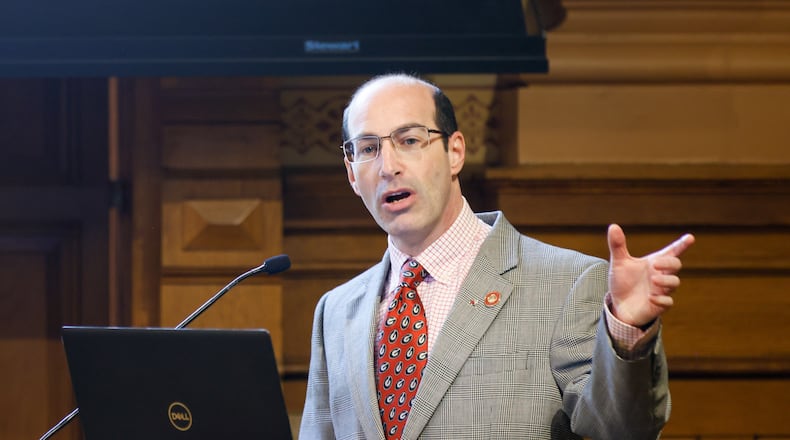State fiscal economist Jeffrey Dorfman told a joint House-Senate panel studying tax breaks Wednesday that incentives to attract and retain businesses should be used sparingly and in a targeted way.
He supported spending to spawn new industries, such as the massive incentives the state is giving car companies to build electric vehicles in Georgia.
Continuing huge tax breaks for “mature industries,” such as Georgia’s film industry, makes less sense, he told the panel, adding that the state “should be looking to shrink or end those credits.”
Dorfman, a longtime University of Georgia economist, was one of several experts and agency heads to review the state’s system of billions of dollars worth of tax incentives for the joint legislative panel, which held its first meeting Wednesday. The session drew a packed audience of lobbyists for businesses that receive the tax breaks.
The tax credit study panel is expected to make recommendations before the 2024 session begins in January.
Speakers on Wednesday went over several incentives, such as tax credits that businesses receive for creating jobs or making business investments.
Andrew Capezzuto, the chief administrative officer and general counsel for the Georgia Department of Economic Development, said the incentives aren’t just public giveaways to businesses.
“We don’t just give away incentives without getting something in return,” he told the committee. “Our incentive programs require a taxpayer to do something in return.”
For instance, businesses have to create jobs or put money into companies before they can get tax breaks from the state, he said.
While lawmakers will review a host of breaks, the business interest with possibly the biggest stake is the film industry. State auditors have called the industry’s more than $900 million-a-year film tax credit the most lucrative such incentive in the country.
Ahead of the hearings, film industry advocates last week put out a glossy, lengthy report compiled by the Georgia State University Creative Media Industries Institute touting the benefits of the film tax credit. Backers say the tax break has led to a mushrooming of the movie and TV production industry in the state that brought $4.4 billion in direct spending here last year.
Senate Finance Committee Chairman Chuck Hufstetler, R-Rome, a co-chairman of the study committee, has proposed putting a $900 million-a-year cap on the fast-growing film tax credit. Senate leaders backed away from that proposal after it passed Hufstetler’s committee near the end of the 2022 session.
Capezzuto told the panel that there have been nearly 1,000 film productions outside of metro Atlanta, and the industry’s report pointed to big job growth there.
That’s important politically because almost all of the General Assembly’s majority Republican leadership comes from outside metro Atlanta.
To show lawmakers the growth in the film and TV industry, Capezzuto said the amount of soundstage square footage in the state will have gone from 50,000 more than a decade ago to 6 million by 2024.
The state Department of Audits and Accounts plans to put out a new review of the film tax credit program by the end of the year.
State auditors have said in the past that supporters of several tax incentives have inflated the impact of the tax credit. The reviews found that in some cases, most of the jobs credited to the state tax breaks would have been created without the credits or exemptions.
Dorfman said with the current job market in Georgia — record or near-record low unemployment in recent years — the question is whether the state needs to work quite so hard using incentives to bring in businesses.
Tax credits can be held for several years, so Dorfman said the outstanding debt on them about equals the state’s rainy day reserve — more than $5 billion. The governor’s annual revenue estimate factors in that some of those credits will be cashed in each year.
“We are not sitting on a ticking financial time bomb,” said Rep. Chuck Martin, R-Alpharetta, a member of the committee.
About the Author
Keep Reading
The Latest
Featured




